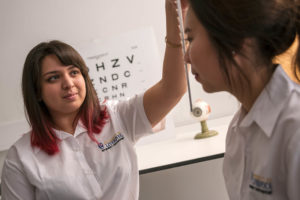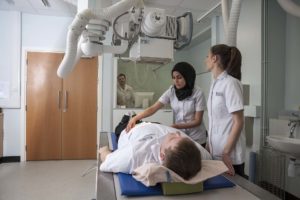How you'll learn
Research-connected teaching and active learning are fundamental to this programme. Each module has around 90 contact hours for the theory and simulation and a further 50 for clinical supervision to assist with the completion of the competencies.
You’ll be taught through a combination of weekly interactive lectures, seminars, one-to-one tutorials and group work. These will be complemented by simulated activities and work-based learning to develop your clinical assessment and diagnostic skills and give you practical experience of managing critically ill patients.
Each weekly session is conducted both in-person and over Zoom to enable you to participate on campus or remotely. Each session is also recorded to enable revision and catch-up.
How you're assessed
Authentic assessments, designed to mirror real-life tasks that you will be required to undertake in day-to-day practice, are a key feature of the course.
A practical clinical skills exam, an unseen short answer exam, an extended literature review and oral presentation are all included in the current assessment methods.
This variety of assessments will enable you to undertake projects and present your findings to your peers. You’ll demonstrate your critical thinking skills when assessing clinical situations, implement a robust and well-reasoned plan of action, and evaluate the effectiveness of tasks undertaken.
Liverpool Hallmarks
We have a distinctive approach to education, the Liverpool Curriculum Framework, which focuses on research-connected teaching, active learning, and authentic assessment to ensure our students graduate as digitally fluent and confident global citizens.
The Liverpool Curriculum framework sets out our distinctive approach to education. Our teaching staff support our students to develop academic knowledge, skills, and understanding alongside our graduate attributes:
- Digital fluency
- Confidence
- Global citizenship
Our curriculum is characterised by the three Liverpool Hallmarks:
- Research-connected teaching
- Active learning
- Authentic assessment
All this is underpinned by our core value of inclusivity and commitment to providing a curriculum that is accessible to all students.









